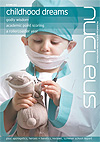Rachel Hubbard describes her first year as a doctor.
It was no surprise that I was not prepared forbeing an F1. After all, I am still surprised everytime I turn up to A&E that there aren't doctors who look like Carter or Kovac from ER!
Medical school was a rollercoaster of pure love for the course, coupled with questioning whether I should even be there – and a lot of fun memories made! I was an active student,playing squash for the university, helping with pre-clinical CMF and having a busy social life. I thought it would be easy to continue that into FY1 – with the European working hours limit, I'd surely have plenty of free time?
The reality was very different, as the effects of friends moving away, long anti-social hours and working Sundays took effect. Evenings once taken up with friendly banter (both on and off the squashcourt) were full of blood taking, reviewing patients and getting home wondering if I'd actually done what I'd written in the notes.
My support network as I'd known it had vanished; catch-up phone calls weren't the sam eas a coffee face-to-face. Friends nearby had different shifts. I was stuck in a pattern of 13-hour shifts, seeing only work colleagues daily,and missing the interaction which had filled my five years of being a student. I felt lonely. Noone else seemed to understand what I was going through. I was seeing patients die in front of me, forever petrified of making a mistake,and having to smile and take abuse from senior doctors. This wasn't what I applied to do and definitely wasn't part of my final exams.
The last year has been a rollercoaster, one of pure highs and all-time lows. Such feelings are not isolated to medics though. Adjusting to working life brings challenges in other jobs too. I've had days when I've wanted to quit; days after witnessing amid-brain bleed where I would cry in the toilet, wondering if I'm ever actually making a difference or whether it would be safer for the patients for me to stay in bed! Yet after one of the worst nightshifts ever, with aspirations, obstructions and astatus epilepticus, a registrar pointed out that even the most rubbish nights come to an end! Do remember that when on call, struggling at 4am.
God does not leave you to go through this alone.Even if your SHO isn't answering their bleep, Godnever switches off to your prayers. I was hugely encouraged by attending CMF's junior doctors'conference in the autumn, if only to be reassured that other doctors found it hard too. It reminded me that I was not alone; that I wasn't a failure.
I struggle to switch off from work. Fear of making mistakes often blighted my tea-times asI wondered if I did what I was meant to do, andwondered if my patients would be alive to greet me the next day(in elderly care thatwas never guaranteed!).We all make mistakes, but being part of a team means others can spot and rectify problems. I'm immensely grateful that God accepts me both as a doctor and as his daughter, just as I am. Not perfect, often clumsy and often saying the wrong things, yet he work sthrough me despite this; he doesn't give up and is patient with me, something I often lack in my life.
Just being there shows practical love. Jesusoften paused with people (like the woman at the well in John 4) which was life-changing for them. My biggest impact has not been via medical knowledge, but by stopping and chatting to patients. Hospitals can be lonely, intimidating places, which we often forget when spending hundreds of hours there. Listening to patients talking about families, being shown photos or sharing valuable advice (like what games to download for your phone!) is really appreciated.I know that patients have appreciated me when they view me as 'normal'; they would regularly laugh at me as I walked backwards into doors, or wore smart dresses without realising the price tag was still on them!
God brings certain patients at certain timesfor a reason. Corrie Ten Boom once said: 'Every experience God gives us, every person he puts into our lives, is the perfect preparation for a future only he can see.' (1)
A great way to serve colleagues is by homebaking. Cakes, cookies and the big winner –marbled heart-shaped chocolates – not only ensure the jobs you ask nurses to do get done with a smile, but bring teams together. God is relational – not distant. He didn't design us to being this world alone. By spending time getting to know people, and practically showing them God'slove, you serve God – trusting and praying he'll work his glory through it.
FY1 is not all doom and gloom. I had some great moments, saw the benefits of investing in goodworking relationships with colleagues, and had opportunities to serve God by working with students both with CMF and through Newcastle Christian Union. I even had time to plug books at CMF National Student Conference!
If I had to summarise FY1 I think I'd steal a lyric from my good friend Chris Martin: 'Nobody said itwas easy, nobody said it would be so hard'. Yet even though it's hard, we serve a God who is bigger than any of the mountains that stand before us. A verse that rings in my head as I have a tough, long day before me is Judges 4:14 'Go! This is the day…Has not the LORD gone ahead of you?'
































